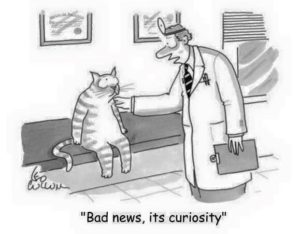
What is so wrong with wanting to know something? What is it that makes us have curiosity? Babies touch and place things in their mouths, all to know more about their small environment. Curiosity is simply learning for learning’s sake. It is wanting to understand ourselves and others. It is wondering why things work. Curiosity is a tendency to explore and know new things. We see people indulge in a traveling to look at new places, new things and new developments taking place outside their environment.
But it can also get us into trouble. Eve could not resist eating of the fruit of the forbidden tree in the Garden of Eden. Lot’s wife could not stop herself from looking back on the destruction of the Sodom and Gamora. In Greek mythology, Pandora opened the box and let loose evil, sickness, and unhappiness. Early religious thinkers thought curiosity was sinful because a lust for knowledge was an attribute reserved for God.
Never-the-less it drives me. I never seem to have enough knowledge. I never seem to have enough information about a situation to decide on the alternatives. And when I do make a choice of the viable options, I am not satisfied and continue to research and consequently second guess myself. Frustrating.
Further, all this knowledge can well become a detriment to reasonable discussion. I have been accused of being a know-it-all. Even though I am constantly bombarded with questions, primarily because I usually have an answer, sometimes I just guess to display my mastery of all that is important.
Two ideas here in defense of the natural desire or motive of curiosity: It can open ourselves to God and it is a perfect solution to judgment.
Yes, curiosity killed the cat, but it does open the greatest discovery of all. The New American Standard Bible states in 2 Timothy 2:15, “Be diligent to present yourself approved to God as a workman who does not need to be ashamed, handling accurately the word of truth.” Study of the Word of God can very well lead to the approval of God. Curiosity can well point to God.
It is not as if God is standing well off our path of life and we must let our curiosity motivate a search hither and yon to find him. God is already at our door gently, patiently waiting for your curiosity to open the door.
The next time you start judging someone or some act, turn on the curiosity. Ask yourself why that person or that act happened. Put yourself in their shoes. Ask questions of the why of the action or expression. The very act of curiosity can well cause us to reassess our own judgmental attitude.
What do you think? Add a comment.

